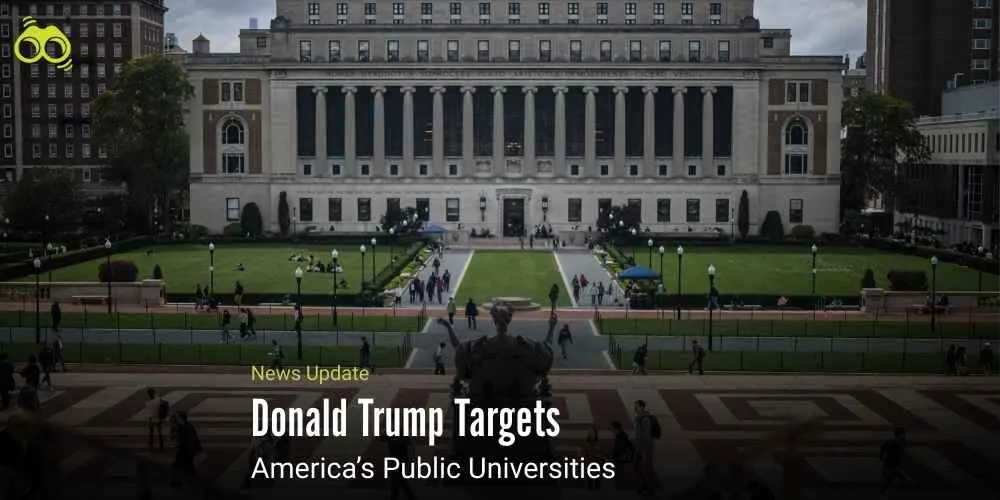UCLA Research Projects Disrupted as NIH and NSF Grants Suspended
Justice Department Accuses UCLA of Indifference to Campus Harassment
As summer drew to a close, the campus of the University of California, Los Angeles (UCLA) appeared outwardly calm. Yet beneath the surface, a storm was brewing, one that could reshape the future of public university funding in the United States. In July, the Department of Justice (DoJ) accused UCLA of being “deliberately indifferent” to antisemitic harassment experienced by Jewish and Israeli students during campus protests. This allegation triggered a dramatic response from the Trump administration, which subsequently froze $584 million in research funding from the National Science Foundation (NSF) and the National Institutes of Health (NIH).
The funding freeze has disrupted critical research projects, including those focused on Alzheimer’s disease, opioid addiction, and other public health priorities. According to observers, President Donald Trump demanded $1 billion, approximately 9% of UCLA’s annual budget, as a condition for restoring the funds. He also called for bans on overnight protests and the removal of diversity, equity and inclusion (DEI) measures. The DoJ reportedly set a 2 September deadline for UCLA to negotiate or face legal action. A former provost described the ultimatum as “nothing less than extortion.”
While some analysts viewed the move as part of a broader conflict between the administration and elite institutions, others stressed that UCLA is not an Ivy League college but a state university serving a vital public role. In fact, nearly three-quarters of American students attend public universities, making any weakening of their resources a matter of national concern. Data from the NSF revealed that seven of the ten top grant-receiving universities are public institutions, including three from the University of California system. UCLA itself ranked seventh, ahead of several Ivy League names, underscoring its importance in driving research and innovation.
The University of California Board of Regents, which governs the system, has reportedly adopted a cautious approach to negotiations. However, Governor Gavin Newsom, also a board member, stated that legal action remained an option, and emphasised that California would not accept terms similar to those agreed upon by Columbia or Brown University. Discussions are underway regarding contingency plans to sustain UCLA’s funding, whether through settlement or prolonged litigation.
Public sentiment appears to support UCLA’s position. A Berkeley poll indicated that 58% of Californians favour increased state funding for the UC system. Nonetheless, faculty leaders have criticised recent policy shifts, such as banning encampments and removing diversity statements from hiring processes, as acts of “anticipatory obedience,” intended to avoid federal confrontation. In contrast, public universities in Republican-led states have largely avoided federal scrutiny. Leaders at institutions such as Miami Dade College in Florida, one of the largest in the country, have expressed confidence that their federal funding remains secure. The college president attributed this to the practical, job-focused orientation of their student body. Similarly, when research funding was withheld from the University of Alabama at Birmingham, state officials successfully lobbied for the release of $15 billion, citing the importance of medical research for public health.
Commentators argue that the situation at UCLA highlights the vulnerability of Democrat-leaning public universities to political pressure. While Ivy League institutions often dominate headlines, it is large state universities like UCLA that serve as engines of economic mobility, scientific advancement, and public service. The outcome of this dispute will be closely monitored by other technology universities and public systems across the country. The UCLA case illustrates how political tensions between the federal government and American university systems could significantly influence the future of higher education funding and the balance between academic autonomy and governmental oversight.
Editor’s Note
The situation unfolding at UCLA is a powerful reminder of how politics and education can collide, with serious consequences. At the heart of the issue is a federal investigation into antisemitic harassment on campus, which has led to the freezing of over $584 million in research funding. This includes money for critical projects on Alzheimer’s, opioid addiction, and public health, areas that affect millions of lives. President Trump’s demand for $1 billion, along with bans on overnight protests and the removal of diversity and inclusion policies, has placed UCLA in a difficult position. The university must now choose between negotiating under pressure or facing legal action. What makes this case especially important is that UCLA is not a private Ivy League institution; it’s a public university serving thousands of students and contributing significantly to national research output. Public universities like UCLA are central to the American education system. They educate the majority of students and receive the bulk of federal research grants. Weakening their resources could have long-term effects on innovation, economic mobility, and public health. While some universities in Republican-led states have managed to avoid similar scrutiny, UCLA’s experience shows how vulnerable public institutions in Democrat-leaning states can be to political pressure. The response from California’s leadership, including Governor Gavin Newsom, signals a strong stance against federal overreach.
As per Skoobuzz, the ongoing dispute transcends the confines of a single university; it fundamentally concerns the future of higher education funding and the delicate equilibrium between academic autonomy and governmental influence. How UCLA addresses this challenge will be a significant precedent, closely observed by universities nationwide.














0 Comments (Please Login To Continue)